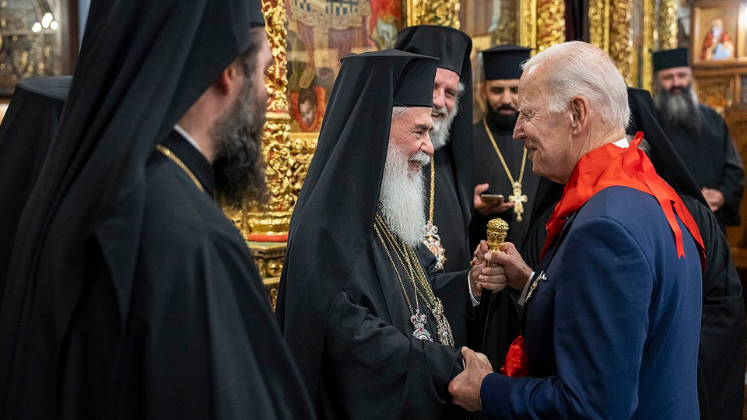Syed Hammaad Mehraj brings a critical lens to international relations, looking at how colonialism affects minds and bodies. In this article, he outlines the arguments against both the secular and Christian foundations of the Enlightenment, and what this says about modern attitudes to violence.

In his thought-provoking book, The Intimate Enemy, the political psychologist Ashis Nandy has written how colonialism manages dissent in its own terms. According to Nandy, it creates “a culture in which the ruled are constantly tempted to fight their rulers within the psychological limits set by the latter” (p. 3). In light of this statement, the article’s objective is to highlight the fact that dissent against occupation is managed in secular epistemology. The article argues that this epistemic bias stems from the conceptualisation of religion in a liberal/secular worldview.
In the recent confrontation we must remember that “modern colonialism won its great victories not so much through its military and technological prowess but through its ability to colonise minds in addition to bodies” (Nandy, 2009). It has released forces within colonised societies that have altered cultural, religious, and even social priorities once and for all. The ability to constitute ‘secular hierarchies’ incompatible with the traditional order has been the epistemic victory of colonialism. For example, while we all are comfortable citing and quoting Chomsky, Pape, Fanon, and Sartre on colonialism, we are hesitant to cite works that do not align with secular/liberal sensibilities. Why is it so? This is the puzzle that the article wants to answer.
The answer lies in the secularism inherent in the “Euro-American definition of religion and its separation from politics as the starting point for social scientific inquiry” (Hurd, 2011). As a consequence of religious wars in Europe and the enlightenment ethos, “politics with reference to religion became the ultimate threat to order, security, and civility” (Petito & Hatzopoulus, 2003, p. 2). The values that the Enlightenment propagated associated “religion with danger, dogma, or rigid conceptions of otherness” (Petito & Hatzopoulus, 2003, p. 5) and proclaimed it to be more prone to violence. The Enlightenment presumptions considered that the “true, the objective, the real, the rational, and even the scientific emerge only with the shedding of religious authority or prejudice” (Asad et al., 2009, p. 11). The Westphalian state is enmeshed in these enlightenment assumptions that have been “uncritically reproduced and de facto accepted as dogma” (Petito & Hatzopoulus, 2003, p. 5). This generalisation of the Euro-American experience of politics, religion, and statehood as representing universal human experience perpetuates the epistemological violence upon which the edifice of secularism is founded (Wilson, 2023, p. 21). Hence, secularism is not natural but is based on a particular conceptualisation of religion. It regulates religion through assumptions it has about religion which are not neutral and universal but rather subjective and particular (Draaisma & Wilson, p. 23).
Thus, the ‘Westphalian Synthesis’ was an epistemic frame whose “first strand is a [secularizing] one” (Philpott, 2002, p. 72) that separated the modern from the premodern and the rational from the irrational. In the subsequent years, the consolidation of the Westphalian state buttressed the claim of the secular overcoming the religious. Secularisation theory had assumed that religion had “retreated from global politics, when arguably it has always been present and relevant, just dismissed or ignored by scholars and analysts” (Wilson, 2023, p. 5). The Westphalian nation-state became an epistemic frame that exiled religious reasoning from making choices about political violence. A war is justifiable if it is waged by a legitimate authority of the sovereign state tied to secular norms and values. Equating legitimate authority with a sovereign state also meant that “there cannot be any legitimate authority over and above that of states” (Bartelson, 2010, p. 81). The “idea behind this “Westphalian presumption” is that religion had to be marginalised, privatised, or overcome by a cosmopolitan ethic to secure international order” (Hurd, 2009, p. 3). Therefore, the only violence acceptable was secular violence waged by the secular state in defence of secular values. As Talal Asad has argued, “however reprehensible it was to liberals, the violence of Marxists and nationalists was understandable in terms of progressive, secular history” (Asad, 2007, p. 8). Therefore, Secularism in real sense is the “continuous management of religious thought and practice by the state” (Iqtidaar, 2011, p. 21) where “our violence, being secular, is rational, peace-making, and sometimes regrettably necessary to contain their [religious] violence” (Cavanaugh, 2009, p. 4). As Cavanaugh puts it, “we [the secular west] find ourselves obliged to bomb them into liberal democracy” (Cavanaugh, 2009, p. 4).
This attempt to create a “concept of religion that is essentially prone to violence is one of the foundational legitimating myths of the liberal nation-state” (Cavanaugh, 2009, p. 4). These myths have constituted a “religious Other, prone to fanaticism, to contrast with the rational, peace-making, secular subject” (Cavanaugh, 2009, p. 4) and have “cast nonsecular social orders, especially Muslim societies, in the role of villain” (Cavanaugh, 2009, p. 4). The Enlightenment narrative has “invented a dichotomy between the religious and the secular and constructed the former as an irrational and dangerous impulse that must give way in public to rational, secular forms of power” (Cavanaugh, 2009, p. 5). The end product of this dichotomy was a “revulsion toward killing and dying in the name of one’s religion” while, on the other hand, “become convinced that killing and dying in the name of the nation-state is laudable and proper” (Cavanaugh, 2009, p. 5).
For scholars like Brown, Western secularism remains a “distinctly Christian project” (Brown, 2012) and has been “constructed through opposition to Islam” (Hurd, 2009, p. 7). As argued by Sayyid, “Muslims come to represent anti-secularism simply by virtue of the fact that the designation ‘Muslim’ is interpreted as being religious, and their appearance within the public spaces of Western plutocracies therefore seems to erode the divide that secularism seeks to institutionalise” (Sayyid, 2014, p. 34). All these values and assumptions are inherent to the secular mind of the West. Hence, violence in the name of religion evokes a tremendous response in comparison to secular violence. It is for these very reasons that the “Islamic revival signals a cultural anxiety in the West. The West sees in Islam the distorted mirror of its own past. It marks the rebirth of the God they had killed so that Man could live” (Sayyid, 2015, p. 4).
Hence, in the case of Palestine, what is commendable and laudable is their fight against the colonial machinery on a distinct episteme that is not a product of Eurocentrism based on enlightenment values. Ultimately, colonialism is a worldview. It is the ontological and epistemological dominance of an Anglo-American framework. It is a mind game, and what begins in minds must end in minds.
Photo by Michael Barera: Milwaukee Art Museum






Wonderful insight of how societies and their perception of others evolve based on their own historical experiences and ambitions. Western society and their colonial mentality based on secularism which is anything but secular, has been aptly described.
Thank you for the engaging read. I would love to read more on these themes. Looking forward to more from your pen.
Very well researched and written!